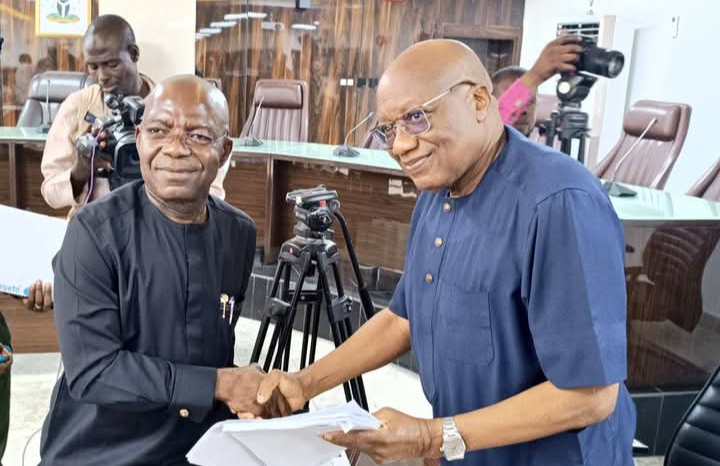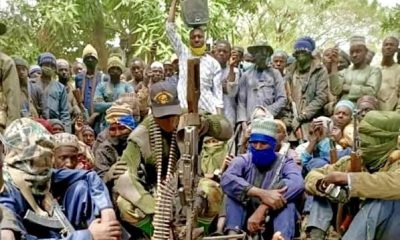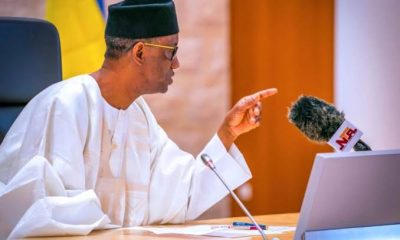News
Ghana becomes record fifth African nation to take over from ruling party this year

Ghana’s vote brings to an end a remarkable 12 months in African politics, which have seen five transfers of power – more than ever before. This “annus horribilis” for governments has now also brought opposition victories in Botswana, Mauritius, Senegal and the self-declared republic of Somaliland.
Even beyond these results, almost every election held in the region this year under reasonably democratic conditions, has seen the governing party lose a significant number of seats.
This trend has been driven by a combination of factors:
*the economic downturn
*growing public intolerance of corruption
*and the emergence of increasingly assertive and well-co-ordinated opposition parties.
The trend is likely to continue into 2025, and will cause trouble for leaders such as Malawian President Lazarus Chakwera, whose country goes to the polls in September.
One of the most striking aspect of the elections that have taken place in 2024 is that many have resulted in landslide defeats for governments that have previously appeared to have a strong grip on power – including in countries that have never before experienced a change at the top.
The Botswana Democratic Party (BDP) that had ruled the country since independence in 1966 was crushed in October’s general elections.
As well as losing power, the BDP went from holding 38 seats in the 69-strong parliament to almost being wiped out.
After winning only four seats, the BDP is now one of the smallest parties in parliament, and faces an uphill battle to remain politically relevant.
There was also a landslide defeat for the governing party in Mauritius in November, where the Alliance Lepep coalition, headed by Pravind Jagnauth of the Militant Socialist Movement, won only 27% of the vote and was reduced to just two seats in parliament.
With its rival Alliance du Changement sweeping 60 of the 66 seats available, Mauritius has experienced one of the most complete political transformations imaginable.
Senegal and the self-declared republic of Somaliland also saw opposition victories.
In the case of Senegal, the political turnaround was just as striking as in Botswana, albeit in a different way.
Just weeks ahead of the election, the main opposition leaders Bassirou Diomaye Faye and Ousmane Sonko were languishing in jail as the government of President Macky Sall abused its power in a desperate bid to avert defeat.
After growing domestic and international pressure led to Faye and Sonko being released, Faye went on to win the presidency in the first round of voting, with the government’s candidate winning only 36% of the vote.
Even in cases where governments have not lost, their reputation and political control have been severely dented.
South Africa’s African National Congress (ANC) retained power but only after a bruising campaign that saw it fall below 50% of the vote in a national election for the first time since the end of white-minority rule in 1994.
This forced President Cyril Ramaphosa to enter into a coalition government, giving up 12 cabinet posts to other parties, including powerful positions such as home affairs.
The recent elections in Namibia told a similar story. Although the ruling party retained power, the opposition has rejected the results and claims the poll was badly manipulated after it was marred by logistical problems and irregularities.
Even with the flaws, the government suffered in the parliamentary election, recording its worst-ever performance, losing 12 of its 63 seats and only just holding on to its parliamentary majority.
As a result, a region that is known more for governments that manage to hold on to power for decades has seen 12 months of vibrant, intensely contested, multiparty politics.
The only exceptions to this have been countries where elections were seen as neither free nor fair, such as Chad and Rwanda, or in which governments were accused by opposition and rights groups of resorting to a combination of rigging and repression to avert defeat, as in Mozambique.
Three trends have combined to make it a particularly difficult year to be in power.
In Botswana, Mauritius and Senegal, growing citizen concern about corruption and the abuse of power eroded government credibility.
Opposition leaders were then able to play on popular anger at nepotism, economic mismanagement and the failure of leaders to uphold the rule of law to expand their support base.
Especially in Mauritius and Senegal, the party in power also undermined its claim to be a government committed to respecting political rights and civil liberties – a dangerous misstep in countries where the vast majority of citizens are committed to democracy, and which have previously seen opposition victories.
The perception that governments were mishandling the economy was particularly important because many people experienced a tough year financially.
High food and fuel prices have increased the cost of living for millions of citizens, increasing their frustration with the status quo.
In addition to underpinning some of the government defeats this year, economic anThis is not an African phenomenon, of course, but a global one.
Popular discontent over inflation played a role in the defeat of Rishi Sunak and the Conservative Party in the UK and the victory of Donald Trump and the Republican Party in the United States.
What was perhaps more distinctive about the transfers of power in Africa this year was the way that opposition parties learned from the past.
In some cases, such as Mauritius, this meant developing new ways to try and protect the vote by ensuring every stage of the electoral process was carefully watched.
In others, it meant forging new coalitions to present the electorate with a united front.
In Botswana, for example, three opposition parties and a number of independent candidates came together under the banner of the Umbrella for Democratic Change to comprehensively out-mobilise the BDP.
A similar set of trends is likely to make life particularly difficult for leaders that have to go to the polls next year, such as Malawi’s President Chakwera, who is also struggling to overcome rising public anger at the state of the economy.
With the defeat of the NPP in Ghana, Africa has seen five transfers of power in 12 months. The previous record was four opposition victories, which occurred some time ago in 2000.
That so many governments are being given an electoral bloody nose against a backdrop of global democratic decline that has seen a rise in authoritarianism in some regions is particularly striking.
It suggests that Africa has much higher levels of democratic resilience than is often recognised, notwithstanding the number of entrenched authoritarian regimes that continue to exist.
Civil society groups, opposition parties and citizens themselves have mobilised in large numbers to demand accountability, and punish governments that have failed both economically and democratically.
International governments, organisations, and activists looking for new ways to defend democracy around the world should pay more attention to a region that is often assumed to be an inhospitable environment for multiparty politics, yet has seen more examples of democratic bounce-back than other regions of the world.
BBC
News
SAD! APC lawmaker dies while asleep

The lawmaker representing Kaura Namoda South Constituency in the Zamfara State House of Assembly, Aminu Ibrahim Kasuwar-Daji, has died.
It was gathered that the lawmaker passed on in his sleep during the early hours of Wednesday.
Aminu Ibrahim Kasuwar-Daji’s sudden death came as a shock to many in the state, especially his colleagues and political associates.
The All Progressives Congress (APC) in Zamfara, the party under which he was elected, expressed deep sorrow over his passage.
Members of the party, including the State Working Committee and other supporters, described his death as a great loss.
They said he was known for his dedication and honesty in serving his people.
His family, community members in Kaura Namoda South, and fellow lawmakers have been thrown into mourning as preparations for his burial began.
According to Islamic rites, he was buried today at 3:00 pm in his hometown of Kasuwar-Daji, located in the Kaura Namoda Local Government Area.
Many in the state have continued to express grief as they remember the role he played in representing the people and contributing to the work of the state assembly.
News
Just in: Sam Olumekun takes over as INEC’s Acting Chairman

Mr. Sam Olumekun has taken over at the Independent National Electoral Commission (INEC) as Acting Chairman.
Olumekun is INEC’s National Commissioner in charge of Information and Voter Education.
He performed his first duties today, receiving a high-level delegation of the Labour Party (LP) at the Commission’s headquarters in Abuja with other National Commissioners in attendance.
The delegation was led by Abia State Governor Dr. Alex Otti, who visited the Commission to discuss key developments within the Labour Party.
It was gathered that both parties engaged in discussions centered on enhancing collaboration and reinforcing democratic values.
During the visit, Governor Otti formally presented a Certified True Copy of the recent Supreme Court judgment concerning the party’s leadership.
He noted that the meeting was aimed at fostering clarity, mutual understanding, and institutional alignment regarding the Labour Party’s current structure.
Mr. Olumekun, the Acting INEC Chairman, reaffirmed the Commission’s unwavering commitment to neutrality, transparency, and the rule of law in the discharge of its constitutional responsibilities.
Recall that a viral WhatsApp message had indicated that Prof. Mahmood was sacked by President Bola Tinubu and replaced with one Prof. Bashiru Olamilekan.
“INEC Chairman Prof. Mahmud Yakubu has been replaced with Prof. Bashiru Olamilekan by President Tinubu,” the message, which had no attribution, read. However, both INEC and the Presidency debunked the widespread report.
Yakubu, who is rounding off his second tenure in office, is expected to exit the system towards the end of this year.
The process of appointing an INEC chairman is the President nominating a candidate and forwarding his particulars to the Department of State Services (DSS) for profiling.
After such screening, the President, thereafter, takes the name to the National Council of State for its advisory review.
Based on the outcome, the President sends the name to the Senate for screening and confirmation.
News
Crude oil prices slide further, now selling below $57

Crude oil prices have dropped below $57, following a previous rate of $59.78.
This decline coincides with the imposition of tariffs on several countries by US President Donald Trump.
A report from West Texas Intermediate attributes this price slump to consistent 6% reductions observed last week.
JPMorgan Chase & Co has warned that these tariffs could likely push both the US and global economies into a recession this year.
The financial institution explained that the tariffs, set to take effect this week, are expected to have widespread economic repercussions.
Market analysts and the business community have expressed concerns about the negative implications of these measures, predicting a slowdown in economic activities and a subsequent decline in oil demand.
-

 News11 hours ago
News11 hours agoBanditry:” I was chained for 32days while in their den, killed my wife as I watch-Nat’l Assembly DD narrates experience
-

 News7 hours ago
News7 hours agoPolice Inspector Slumps, Dies While Celebrating After Arsenal Wallop Real Madrid 3-0
-

 News12 hours ago
News12 hours agoUS revokes more than 500 foreign student visas
-

 News18 hours ago
News18 hours agoBandits have seized control of 64 communities in Plateau – Gov Muftwang
-

 News14 hours ago
News14 hours agoIbas picks administrators for 23 Rivers LGs(SEE list)
-

 Economy18 hours ago
Economy18 hours agoMobile Money transactions hit $1.68trn in one year
-

 News19 hours ago
News19 hours agoRibadu warns against ransom payment to terrorists, kidnappers, others
-

 News6 hours ago
News6 hours agoSAD! APC lawmaker dies while asleep

















